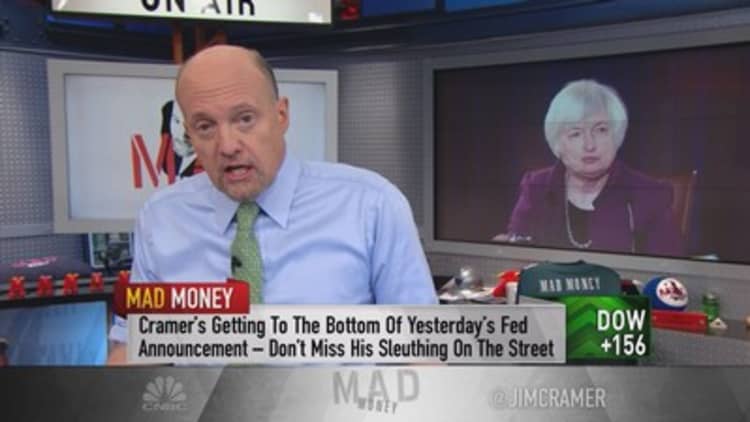
After raising rates in December, the Federal Reserve confirmed on Wednesday that it would not stick to its plan of four rate hikes in 2016. Jim Cramer was intrigued to find out what prompted the Fed to take this action.
"I think this puzzle has to be solved, because it is the difference between grabbing the next big entry point versus taking a pass," the "Mad Money" host.
Back in the fall, there were many investors calling for a rate hike, but the collapse in China reversed those views. But then the Dow rebounded, and China appeared to be under control.
Janet Yellen didn't want to be the reason why we went into recession just to please a handful of hawks who will never change their minds anyway.Jim Cramer
And even though the U.S. was getting softer non-wage data, the Fed took action. All of a sudden, the market began to take out its so-called "artificial" flash crash lows as emerging markets around the world collapsed. Domestic manufacturers were hit hard by the stronger dollar, while central bankers took advantage of it.
"Any thinking person on the Federal Reserve would have to believe that their December rate hike triggered a wave of deflation that had been hinted at, about but turned out to be spot on, coupled with a dramatic and instant decline in the wealth effect that had been buoying retail," Cramer said.
Read more from Mad Money with Jim Cramer
Cramer Remix: Donald Trump's impact on Apple
Cramer: Euro's war on the dollar is officially over
Cramer: Listen to Donald Trump
So, the first reason why the Fed changed course? Risks suddenly tilted towards deflation, which could have had grave impact on the economy.
The second reason was due to actual wage growth. Cramer thinks the Fed saw that employment was stronger, but wages were not. This was contrary to what the textbooks say should happen.
The third reason was that the national economic narrative changed to be protectionist over U.S. jobs. Cramer sensed that the election has been all about protecting the U.S from foreign countries that want to take jobs away.
"I was amazed at how little people paid attention to the political dynamic out there when they discussed the Fed's more dovish stance. To me it is front and center," Cramer said.
Finally, the entire holiday season was dominated by the digital economy. It was clear to Cramer that the Internet, coupled with globalization has produced a lower standard of living.
This toxic cocktail of issues, combined with government mandated health care costs and skyrocketing rents was the reason why Cramer thinks it was too much for the Fed to bear.
"Janet Yellen didn't want to be the reason why we went into recession just to please a handful of hawks who will never change their minds anyway," Cramer said.
Questions for Cramer?
Call Cramer: 1-800-743-CNBC
Want to take a deep dive into Cramer's world? Hit him up!
Mad Money Twitter - Jim Cramer Twitter - Facebook - Instagram - Vine
Questions, comments, suggestions for the "Mad Money" website? madcap@cnbc.com



